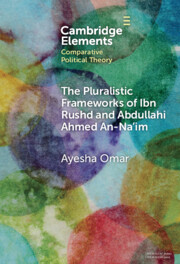Refine search
Actions for selected content:
1 results

The Pluralistic Frameworks of Ibn Rushd and Abdullahi Ahmed An-Na'im
-
- Published online:
- 28 January 2025
- Print publication:
- 20 February 2025
-
- Element
- Export citation
